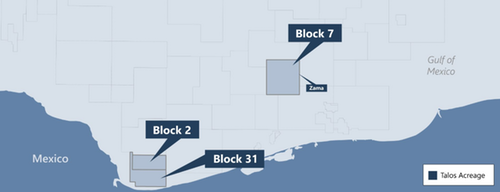 The Zama oil field is in block 7 offshore Mexico.
The Zama oil field is in block 7 offshore Mexico.
The best-estimate of the 2C recoverable resource estimate is around 670 MMboe, with 60% of the field’s reserves thought to lie in block 7.
The Zama reservoir extends east into an adjacent block operated by Pemex and is subject to unitization talks between the two sets of license holders.
In the high-end, 3C case, the estimate is around 1,010 MMboe. In both scenarios, good-quality oil accounts for roughly 94% of the total resource, with API gravities averaging 28°.
NSAI’s study, which followed last year’s appraisal drilling campaign, was based on a geological data set compiled from four successful reservoir penetrations, including a down-dip test to confirm an oil-water contact.
In addition, the data set included more than 1,400 ft (427 m) of whole core samples, an extended flow test, 185 pressure samples, 60 physical oil samples and 28 well logs.
Talos President and CEO Timothy S. Duncan said: “We will continue to advance the project engineering and design work while also finalizing unitization procedures.”
Last month the block 7 partners presented a formal notice to Mexico’s Ministry of Energy (SENER) providing technical evidence of the shared Zama reservoir. This should help advance the unitization process by allowing SENER to seek the technical opinion of Mexico’s National Hydrocarbon Commission (CNH) on the data.
Preliminary front-end engineering and design has been completed, and early FEED work is under way to develop detailed engineering. Talos plans two fixed production facilities capable of handling 150,000 b/d combined, plus associated gas.
The field is in around 550 ft (168 m) of water, and the production platforms would therefore be the deepest installed offshore Mexico, Talos claimed.
The current target is first oil in 2023, and the production could generate around $28 billion of fiscal revenue to Mexico’s government, Duncan said, in addition to Pemex’s share of Zama.